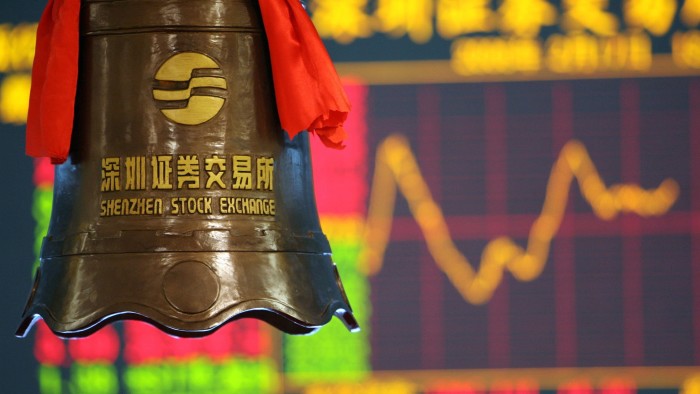China fast-tracks approval of large batch of ETFs

Simply sign up to the Exchange traded funds myFT Digest -- delivered directly to your inbox.
Latest news on ETFs
Visit our ETF Hub to find out more and to explore our in-depth data and comparison tools
China’s securities regulator approved 17 exchange traded funds on a single day as part of a speeded-up process that resulted in three dozen public funds being authorised for sale.
The ETFs, which were part of the unusually large number of approvals on Friday last week, will invest in small-cap stocks and technology start-ups, according to regulatory filings posted on the China Securities Regulatory Commission website.
Of the new ETFs, 10 will replicate the new CSI 2000 index of small-cap stocks listed on Chinese stock exchanges, while the remaining seven will follow two similar indices that track companies specialising in information technology innovation.
The approval of the large group of passive products comes just two weeks after the first applications reached the regulator, on the back of a new rule passed in August by the Shanghai and Shenzhen stock exchanges to hasten the approval process for some equities index products.
The rapid regulatory approval process is being widely interpreted as part of efforts by Chinese authorities to stimulate more stock trading and urge more investor money into China’s A-share market.

This article was previously published by Ignites Asia, a title owned by the FT Group.
Despite a broader lull in overall fund sales, Chinese fund groups raised Rmb42.3bn ($5.8bn) via 58 new ETFs in the first half of this year, up from Rmb27.7bn from a similar tally of strategies in the same period last year, Wind data shows.
Since July, 24 new ETFs have been approved for launch.
The flurry of ETF approvals comes as assets in Chinese equities ETFs jumped more than a quarter to Rmb1.6tn in the first seven months of the year, even as investors continued to shun active strategies.
The 10 companies that will launch the CSI 2000 ETFs, including E Fund Management, Bosera Asset Management and Fullgoal Fund Management, all submitted the applications on August 11, the day the new index went live officially.
The CSRC acknowledged the applications on August 16 and officially approved all of them just over a week later.
For the seven IT-themed ETFs, the seven fund companies handed in the documents on August 18, before receiving the regulatory nod seven days later.
On the same day, the CSRC proposed a package of market-friendly reforms in an effort to boost equities investment amid a slowdown in China’s post-pandemic economic recovery.
In a statement, the regulator said it was considering “relaxing the conditions for registration of index funds, enhancing the efficiency of the development of index fund products and encouraging fund managers to increase product innovation”.
Analysts quoted in local media said they believed the swift ETF approvals reflected Beijing’s goal of achieving self-reliance in strategic industries through developing homegrown high-tech sectors.
Lin Weibin, head of index investment at E Fund, said the debut of small-cap ETFs would “fill a void” in the Chinese market.
The CSI 300 index, CSI 500 index and CSI 1000 index only represent 80 per cent of all China’s A-shares in terms of market cap and miss out on many small and microcap stocks.
At present, the proportion of public fund portfolios allocated to the constituents of the CSI 2000 index is only 2.75 per cent, significantly lower than the allocations of at least 5.6 per cent for each of its bigger three index cousins.
China’s equities ETFs have attracted strong inflows this year while active strategies underperformed amid a sluggish market. Wind data shows that local stock ETFs received more than Rmb100bn in net capital in the second quarter.
In addition to the 17 approved ETFs, China Asset Management and China Southern Asset Management have applied to launch ETFs that track foreign small-cap shares.
Separately, the CSRC approved last Friday the rollout of China’s first 20 mutual funds that have a new tiered-fee model feature.
This brought the total number of new funds approved on just a single day last Friday to 37, according to regulatory filings.
Latest news on ETFs

Visit the ETF Hub to find out more and to explore our in-depth data and comparison tools helping you to understand everything from performance to ESG ratings
The no-return, no-fee funds have been introduced in response to a policy issued by the CSRC in April last year aimed at promoting active funds but also reducing fees in the public fund industry.
In early July, the regulator confirmed sweeping reforms that brought down management fees on active funds in the local market to a maximum of 1.2 per cent, 30 per cent lower than the previous cap.
As of last week, more than 70 per cent of Chinese fund houses had slashed such charges on their fund products, Wind data shows, implementing the reductions on four-fifths of active equities funds.
Over the weekend, more than 20 top brokerages in China lowered equities transaction handling fees while the government halved the stamp duty on stock trading after regulators announced several reforms to try to boost investment and trading over the past two months.
*Ignites Asia is a news service published by FT Specialist for professionals working in the asset management industry. Trials and subscriptions are available at ignitesasia.com
Comments